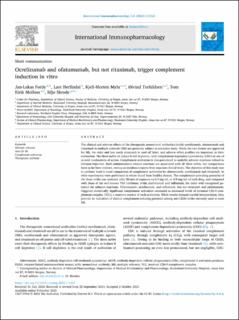| dc.contributor.author | Førde, Jan-Lukas | |
| dc.contributor.author | Herfindal, Lars | |
| dc.contributor.author | Myhr, Kjell-Morten | |
| dc.contributor.author | Torkildsen, Øivind | |
| dc.contributor.author | Mollnes, Tom Eirik | |
| dc.contributor.author | Skrede, Silje | |
| dc.date.accessioned | 2024-02-13T12:44:50Z | |
| dc.date.available | 2024-02-13T12:44:50Z | |
| dc.date.created | 2023-10-21T13:06:30Z | |
| dc.date.issued | 2023 | |
| dc.identifier.issn | 1567-5769 | |
| dc.identifier.uri | https://hdl.handle.net/11250/3117297 | |
| dc.description.abstract | The clinical and adverse effects of the therapeutic monoclonal antibodies (mAb) ocrelizumab, ofatumumab and rituximab in multiple sclerosis (MS) are presently subject to extensive study. While the two former are approved for MS, the older and less costly rituximab is used off label, and adverse effect profiles are important in their evaluation. The three mAbs all induce B cell depletion, with complement-dependent cytotoxicity (CDC) as one of several mechanisms of action. Complement activation is also postulated to underlie adverse reactions related to infusion/injection. Such administration-related reactions are associated with all three mAbs, but comparisons have so far been indirect, resting on incidence reports from separate clinical trials. The objective of this study was to perform head-to-head comparison of complement activation by ofatumumab, ocrelizumab and rituximab. In vitro experiments were performed in whole blood from healthy donors. The complement-activating potential of the three mAbs was analyzed after 30 min of exposure to 0.3 mg/mL or 0.9 mg/mL of each drug, and compared with those of the well-known TNF inhibitory mAbs adalimumab and infliximab, the latter with recognized potential for infusion reactions. Ofatumumab, ocrelizumab, and infliximab, but not rituximab and adalimumab, triggered statistically significant complement activation measured as increased levels of terminal C5b-9 complement complex (TCC), a sensitive marker of such activation. While results demand careful interpretation, they provide an indication of distinct complement-inducing potential among anti-CD20 mAbs currently used to treat MS. | en_US |
| dc.language.iso | eng | en_US |
| dc.publisher | Elsevier | en_US |
| dc.rights | Navngivelse 4.0 Internasjonal | * |
| dc.rights.uri | http://creativecommons.org/licenses/by/4.0/deed.no | * |
| dc.title | Ocrelizumab and ofatumumab, but not rituximab, trigger complement induction in vitro | en_US |
| dc.type | Journal article | en_US |
| dc.type | Peer reviewed | en_US |
| dc.description.version | publishedVersion | en_US |
| dc.rights.holder | Copyright 2023 the authors | en_US |
| dc.source.articlenumber | 111021 | en_US |
| cristin.ispublished | true | |
| cristin.fulltext | original | |
| cristin.qualitycode | 1 | |
| dc.identifier.doi | 10.1016/j.intimp.2023.111021 | |
| dc.identifier.cristin | 2187083 | |
| dc.source.journal | International Immunopharmacology | en_US |
| dc.identifier.citation | International Immunopharmacology. 2023, 124 (B), 111021. | en_US |
| dc.source.volume | 124 | en_US |
| dc.source.issue | B | en_US |

